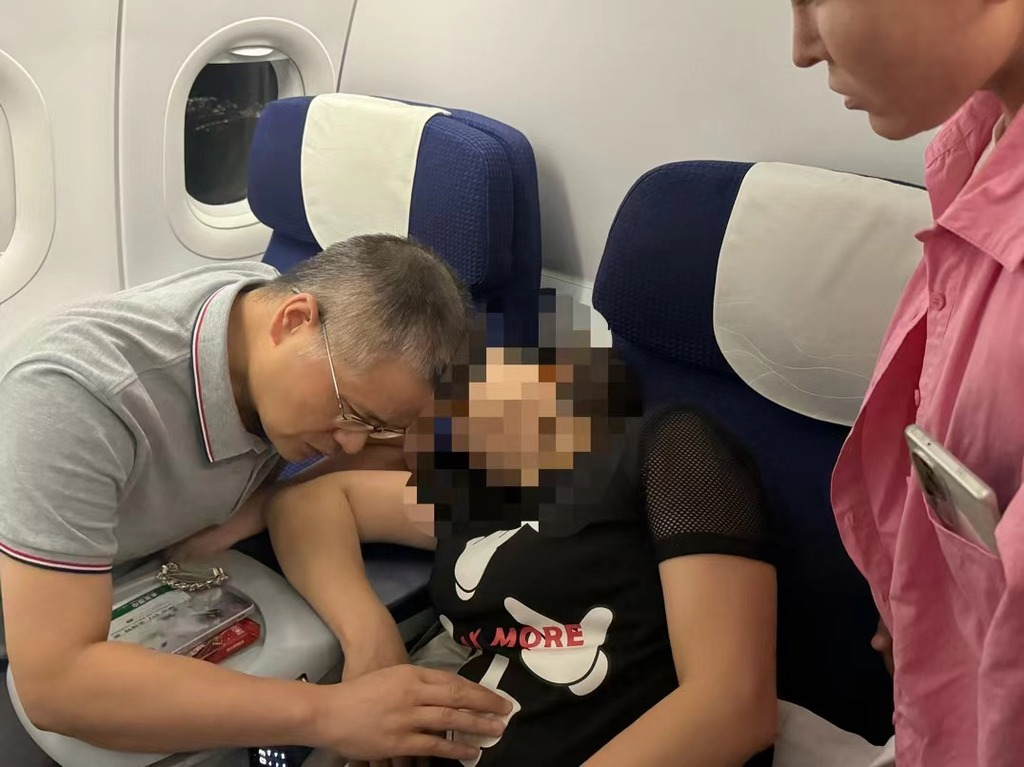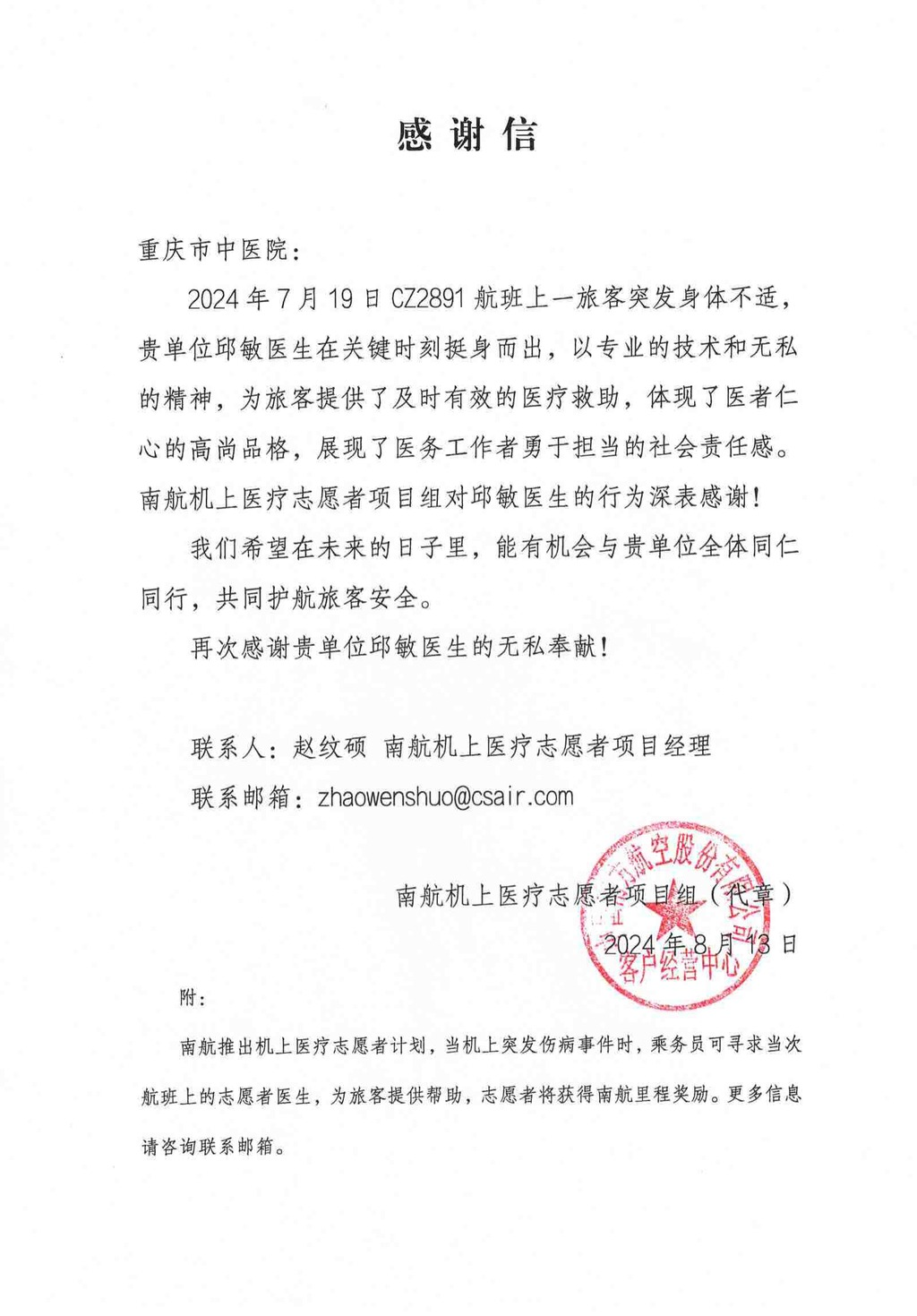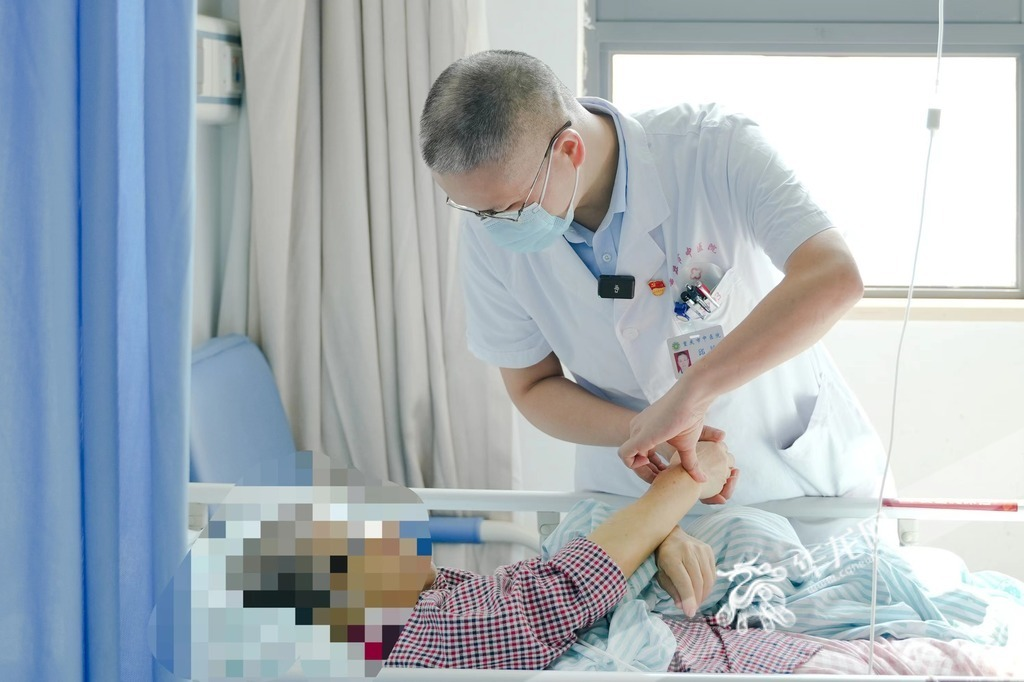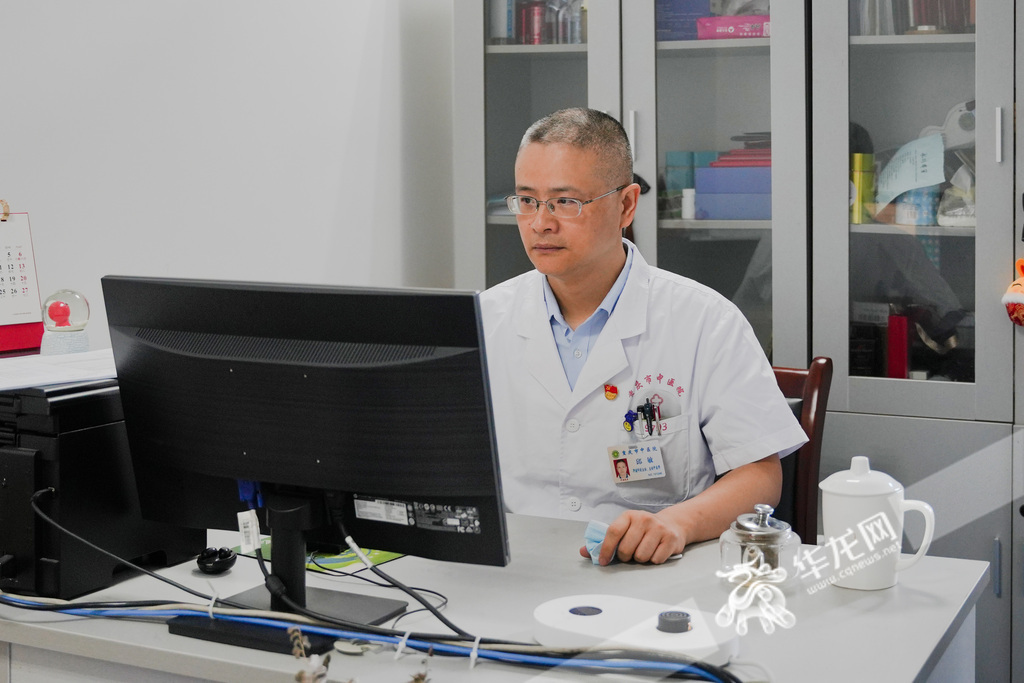Life-and-death race against time in the clouds
2024-08-21 14:41:55
CHONGQING (CQNEWS) -- Qiu Min, Deputy Director and Chief Physician of the Oncology Department at Chongqing Traditional Chinese Medicine Hospital, has saved countless patients over his 30-year career. However, never before had he done so at an altitude of 10,000 meters.

On the evening of July 19, at 19:20 Beijing time, China Southern Airlines flight CZ2891 took off from Terminal 3 at Chongqing Jiangbei International Airport, bound for Yiwu Airport. The flight was expected to land in just two hours. Dr. Qiu Min was on board, invited by the Zhejiang Provincial Society of Chinese Materia Medica to attend an academic conference.
This routine journey took an unexpected turn more than one hour into the flight when an urgent call for medical assistance rang through the cabin. A female passenger in first class had suddenly fallen ill.
Dr. Qiu Min, raised in a family of medical practitioners, knew what he had to do. After identifying himself to the crew, he quickly moved to the first-class cabin to assess the situation. The passenger was barely conscious, teetering on the edge of unconsciousness. With his extensive experience and expertise in Traditional Chinese Medicine, Dr. Qiu spent 20 minutes treating the patient, who gradually began to stabilize.
On August 13, Dr. Qiu received a heartfelt thank-you letter from China Southern Airlines, a gesture he described as the best gift for Chinese Doctors’ Day.

A passenger suddenly fainted at 10,000 meters
The patient, a woman in her 40s, was in serious distress when Dr. Qiu arrived. Her face was pale, her lips cyanotic, and she had suffered convulsions just one minute before.
Dr. Qiu's priority was to rule out a cardiac issue. After checking the pulse for over one minute, he found the heart rate regular, dismissing the likelihood of arrhythmia.
He then inquired about any pre-existing medical conditions, but the passenger reported none. The woman, though weak, managed to convey that she was experiencing severe stomach pain and an urgent but unsuccessful need to defecate.
Considering these symptoms, Dr. Qiu initially suspected a gastrointestinal problem. He then consulted with the flight attendants about the passenger's in-flight consumption.
The flight attendants recalled that the passenger had yogurt, a large iced drink, and a fruit plate.
Qiu surmised that the woman might be suffering from gastrointestinal spasms induced by consuming cold foods rapidly. Further examination revealed significant tenderness across the passenger's abdomen, confirming Dr. Qiu’s hypothesis. The sudden change in body position, coupled with the abdominal distress, likely triggered a vagus nerve reflex, causing the fainting spell.

TCM treatment saved the patient
With the diagnosis in hand, Dr. Qiu was challenged by how to treat it.
“At that moment, I was especially thankful for my background in TCM,” Dr. Qiu later reflected. "There were no relevant medications or medical equipment on the plane, but TCM offers techniques to regulate internal organs through specific acupuncture points.” The "Song of Four General Acupoints" of TCM highlights the efficacy of the Zusanli acupuncture point.
The Zusanli acupuncture point is the confluent point of the Stomach Meridian of Foot-Yangming, in regulating gastrointestinal functions. It is particularly effective in treating various gastrointestinal disorders such as stomachache, vomiting, abdominal distension, abdominal pain, intestinal rumbling, indigestion, diarrhea, and constipation.
Recalling the TCM principle from the "Song of Four General Acupoints," which recommends the Zusanli point for abdominal issues, Dr. Qiu began by applying firm pressure with her thumbs on the Zusanli point for about one and a half minutes. The passenger's condition improved visibly; her abdominal pain eased, her complexion brightened, and the cyanosis in her lips began to fade. Dr. Qiu then proceeded to massage the Zhongwan, Tianshu, and Liangqiu acupuncture points. After 10 more minutes of this treatment, the woman’s abdominal pain significantly subsided, and her overall condition improved.
In just 20 minutes of TCM treatment, the passenger had largely recovered.
“As we were descending, I reflected on how, at 10,000 meters, without diagnostic tools or medication, I was able to rely on TCM techniques and my hands to stabilize a patient. It was incredibly fulfilling,” Dr. Qiu remarked. Receiving the thank-you letter just days before Chinese Doctors' Day felt like the perfect acknowledgment of his efforts.
For medical professionals, saving lives and alleviating suffering is a profound responsibility. Mastering a skill that allows them to rescue those in distress and receiving recognition from those they’ve helped are the ultimate rewards.

(Translated by Yuki, Fathom Language Limited)
Editor:江夷玮
 手机阅读分享话题
手机阅读分享话题